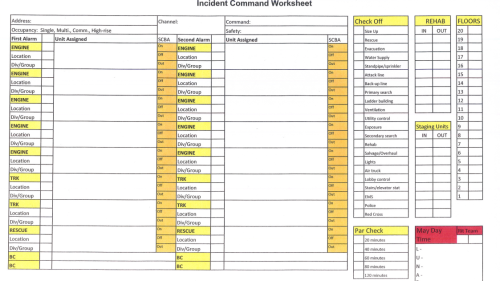On Nov. 23, 2018, Loretta Pickard, 76, died in a fire at her home in Polk County, Florida.
Pickard could be heard telling a 911 dispatcher, “I think my house is on fire, and I’m here alone and I’m on a walker.” During her 20-minute conversation with the dispatcher, she asked, “They know I’m in here, right? “They’re coming for me, aren’t they?”
Due to the rural location, it took firefighters approximately 14 minutes to arrive on scene.
Pickard remained in contact with 911 for approximately five minutes after the fire department has arrived at her home, but nobody went inside to rescue her.
Pickard ultimately perished in the fire.
Audio highlights leadership breakdowns
Listening to the audio of this incident is difficult and heartbreaking. Watching the disastrous press conference by the deputy county manager and fire chief was also painful.
We’ve already heard a great deal of criticism of the suppression side of this incident, so I’d like to focus on the apparent leadership failures that occurred on two levels: communications and incident command.
It was also reported that the initial-arriving incident commander, a captain, was disciplined for posting photos of this fire on Snapchat.
While it is easy to blame 911 or the initial-arriving captain and crew, we must remain objective and look at all aspects of this incident to see what went wrong and where, so this will never happen again. As you listen to this call and the obvious mistakes that were made, don’t just simply post a nasty comment about this department, but ask yourself, “Could this happen in my community?”
Communication failures
Based on the 911 call recordings, it took two minutes for the 911 call-taker to adequately determine that Loretta Pickard, a disabled woman, was still trapped inside the residence.
It also appears that ineffective instructions were given to the victim to aid in her escape given the lengthy response time for the fire department to reach her home. She was never asked how close she was to the nearest door or window. The call-taker repeatedly assured Pickard that help was on the way, rather than taking charge and giving her direct instructions about getting out of the residence by any means possible. The call-taker could have instructed Pickard to seek refuge behind a closed door as an option if escape was not possible.
The 911 dispatcher relayed to crews multiple times that someone was trapped inside from the time of initial dispatch. However, it wasn’t until later in the incident that the call-taker made it clear to on-scene firefighters that they were actually still on the phone with the person trapped.
This points to potential problems when 911 call-takers are only reading from a script and may not be adequately trained or prepared to apply critical thinking skills to a situation.
Command failures
Upon arrival of the captain who assumed initial command of the incident, heavy smoke was reported and a request for another tanker to respond was made. The captain advised that accountability was at E-6 and called for a courtyard lay with a defensive fire attack to be made. No immediate order was given to the first-arriving crew to make entry.
Approximately two minutes later, the IC reports 50% involvement of the structure and requests a two-in/two-out crew is needed by the next arriving company and confirms an entrapment. Battalion Chief 1 then arrived, assumed command and reported that the fire was fully involved.
According to the fire chief during a news conference, several of the firefighters attempted to make entry and received minor burns. However, there is no documentation of when this was attempted.
It is shocking that the initial command officer was not familiar with the two-in/two-out department protocol to know to forego it when someone was trapped inside, which wasted valuable time, and did not call for the immediate entry into the structure by on-scene firefighters. It is also disturbing that the battalion chief who was en route and in communication with the on-scene IC did not correct the two-in/two-out error prior to their arrival.
Risk a lot to save a lot
Sadly, the tragic loss suffered by the Pickard family may never heal. In July 2019, Polk County commissioners unanimously approved a $200,000 settlement offered to Pickard’s family estate.
The consequences of poor communication, mismanagement and the incompetence demonstrated at this fire have a long-lasting impact on the Polk County Fire Department and its members.
In closing, my words are simple: We must never forget that we are here to serve Loretta Pickard. That must be True North on our fireground compass. If we lose sight of that fact, priorities can become mixed up. Life safety of the victim must always be our No. 1 priority. We should risk a lot to save a lot. The public expects that from us.
FDNY crews battled heavy fire, a partial collapse and nearly nine hours of operations during a five-alarm matzo factory fire in Brooklyn
This article, originally published on January 07, 2020, has been updated with a video and additional resources.









